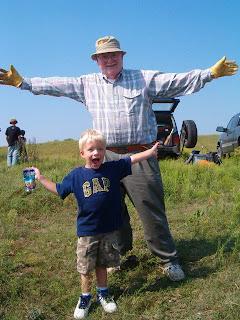
I often play the game of imagining what I would do if I got to go back in time with the knowledge and experience I now have and be reinserted into my younger body.
What would you do if you could do it over, knowing what you now know? This isn't meant to be an exercise in regrets, it's meant to be a fun mental exercise of what the benefit of your experience would do to guide you now. I realize that it is comforting to hear a aged person preparing to die, when they say, "I have no regrets. If I had it all to do again, I'd do it exactly the same." I understand that part of what someone is saying when they make this statement is that they love their family and friends very much and can't imagine doing anything differently because they wouldn't have those people in their lives. That's a nice sentiment to express to someone, that they are important to you and that you love them.
The point of my mental exercise is not to do your life over. You've already done that life once. The point of the exercise is to get another chance and this time you do it differently. So the point, since this is impossible anyway, is to dream about what kinds of things you could have done differently. If you went back and made some changes, how would things have turned out? So part of the fantasy is actually trying to understand cause and effect. What are the consequences of your actions? What are things that lead to consequences, and what are things that we fail to do because we fear consequences, when in fact there would either be no repercussions. There might even be positive results from actually speaking out or taking action when our inclination is to remain silent or not react. It's funny how sometimes you see someone blurt something out and you secretly cheer their candor, and other times you shrink away from the scene in embarrassment.
So, specifically, some of the things I would try differently if this time transplant could actually take place. I tell myself I would date differently in high school and college. Not to "score" more, but to get to know more people, more casual dates. I think the power of being older is realizing that things were not so impossible as they seemed at the time. The other thing I would do differently is to study another major. Actually, I could play this game several times, as there are many other majors I would like to have tried. I started out in Chemical Engineering and ended up in Mechanical Engineering, so one thought would be to go back and stay in Chemical Engineering, this both because I was interested in the subject, but also to prove that I could. But I also really like Biology, Physics, and Astronomy, so I can see trying those fields. I don't really get excited about going back and trying fields that I know I would not be interested in ever just because they would make more money (Law, for example). I don't know if I would stay in school and get an advanced degree, or not.
I would not get married young as I did, which is easy and a no-brainer. My first wife was not the right person for me, as it turns out, and part of the exercise is that you get to avoid mistakes that you made the first time around. I went in the Army and went overseas to Panama and from there deployed all over South and Central America. Being married then was just cruel to her, as she had to sit around waiting for me to get back. If I didn't have someone that I was holding hostage, I would have gone to these deployments with nothing but enjoyment of what I was experiencing. Another thing I would correct would be to always have a camera and take pictures everywhere I went.
I wonder many times if I could go back and make my parents quit smoking and take care of themselves. I don't know if this is even possible, to alter the behavior of other people. I used to adamantly insist that people make their own choices, and you can't impose your will on others. But my parents both died pretty young, and I look around at people my own age and sometimes 10 or 15 years older that still have their parents. My parents missed a lot of good things in life, and denied their grandchildren the benefit of knowing them and the getting to spend time with them.
Other than that, there's not much else that I care to change. I would travel differently, but I still plan on doing some of the travelling that I've always dreamed of. I imagine that it would be great to buy stocks that you now know would do well, but honestly, I'm not paying that much attention to these things, so I can't say experience would benefit me. I guess you could go back after memorizing a winning lottery number, that would be fun, but it's not certain that the same numbers would come up. Going back supposedly changes things, so it may be that the things you do differently would make the numbers come out differently.
One of the things that I consider when playing this mental game is to wonder what the me of 10, 15, or 20 years from now would be telling the me of right now to do differently. I think that would make for a useful mental exercise. Figure out how a more experienced mature you would do things, and temper your actions based on this knowledge. Somehow, I can't ever get my mind wrapped around this game as easily. Maybe it's a zen thing.
In reality, the great thing about life is that we don't know what's going to happen next. It's a new and exciting adventure that unfolds each day. You don't get an unlimited supply of life, so you might as well enjoy it and make the best of it while you can.


















